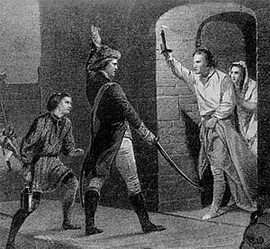13 Aug Ethan Allen on God, Reason, Prayer, & Religion
 In this final installment of our special series on the Founding Fathers Religion, we move to farmer, politician, and guerilla revolutionary leader Ethan Allen, who perhaps is best known for leading the Green Mountain Boys (and other fighters) in their raid and capture Fort Ticonderoga, a strategic victory which severely hampered communication between the northern and southern units of the British army.
In this final installment of our special series on the Founding Fathers Religion, we move to farmer, politician, and guerilla revolutionary leader Ethan Allen, who perhaps is best known for leading the Green Mountain Boys (and other fighters) in their raid and capture Fort Ticonderoga, a strategic victory which severely hampered communication between the northern and southern units of the British army.
Like Thomas Jefferson and Benjamin Franklin, Ethan Allen might be best described as a Progressive Christian Deist who believed reason must take a paramount place in religious activity. The following passage is taken from Section IV of Ethan Allen’s book, Reason: The Only Oracle of Man (1784), and deals with the subject of prayer. In synch with the philosophy of prayer that guides our free book The Living Hour: The Lord’s Prayer for Daily, Allen writes:
Whoever has a just sense of the absolute perfection of God, and of their own imperfection, and natural subjection to his providence, cannot but from thence infer the impropriety of praying or supplicating to God, for this, that, or the other thing; or of remonstrating against his providence: inasmuch, as “known to God are all our wants;” and as we know, that we ourselves are inadequate judges of what would be best for us, all things considered.
To pray for any thing, which we can obtain by the due application of our natural powers, and neglect the means of procuring it, is impertinence and laziness in the abstract; and to pray for that which God in the course of his providence, has put out of our power to obtain, is only murmuring against God, and finding fault with his providence, or acting the inconsiderate part of a child; for example, to pray for more wisdom, understanding, grace or faith; for a more robust constitution, handsomer figure, or more of a gigantic size, would be the same as tolling God, that we are dissatisfied with our inferiority in the order of being; that neither our souls nor bodies suit us; that he has been too sparing of his beneficence; that we want more wisdom, and organs better fitted for show, agility and superiority.
But we ought to consider, that “we cannot add one Cubit to our stature,” or alter the construction of our organic frame; and that our mental talents are finite; and that in a vast variety of proportions and disproportions, as our Heavenly Father in his order of nature, and scale of being saw fit; who has nevertheless for the encouragement of intelligent nature ordained, that it shall be capable of improvement, and consequently of enlargement; therefore, “whosoever lacketh wisdom,” instead of “asking it of God,” let him improve what he has, that he may enlarge the original stock; this is all the possible way of gaining in wisdom and knowledge, a competency of which will regulate our faith. But it is too common for great faith and little knowledge to unite in the same person; such persons are beyond the reach of argument and their faith immovable, though it cannot remove mountains.
The only way to procure food, raiment, or the necessaries or conveniences of life, is by natural means; we do not get them by wishing or praying for, but by actual exertion; and the only way to obtain virtue or morality is to practice and habituate ourselves to it, and not to pray to God for it: he has naturally furnished us with talents or faculties suitable for the exercise and enjoyment of religion, and it is our business to improve them aright, or we must suffer the consequences of it. We should conform ourselves to reason, the path of mortal rectitude, and in so doing, we cannot fail of recommending ourselves to God, and to our own consciences. This is all the religion which reason knows or can ever approve of.
